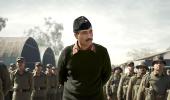Besides his strategic and tactical acumen, it was his amazing personality, quick wit and ability to remain unflustered under any circumstances that stood him apart from almost any leader one has read about or known, recalls Lieutenant General Syed Ata Hasnain (retd).
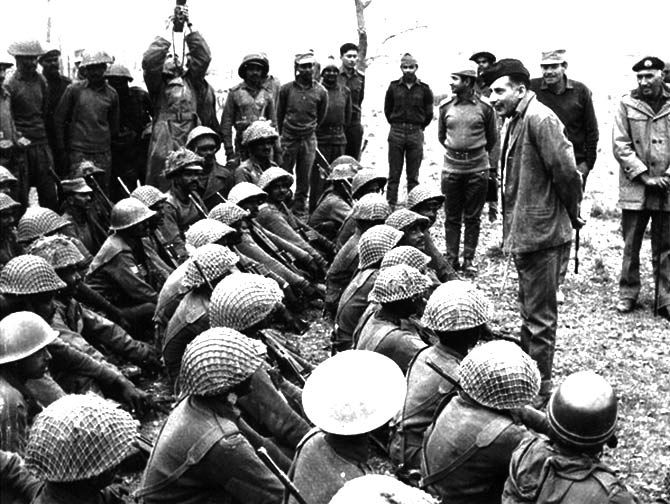
The doyen of India's military leaders, Field Marshal Sam Hormusji Framji Jamshedji Manekshaw, known as Sam to all, was an icon in his own right.
Besides his strategic and tactical acumen, it was his amazing personality, quick wit and ability to remain unflustered under any circumstances that stood him apart from almost any leader one has read about or known.
It was in May 1987, at the Defence Services Staff College (DSSC) that we had all gathered for the end of the course ceremony; the most revered course of the Armed Forces which runs almost ten months at the beautiful hill station of Wellington.
Sardar Patel was the name of the hall in which we were all cramped, the much larger Trishakti complex came up a few years later.
I sat on the side in the centre of the hall for a special reason; I had to get up and go to the dais, for a purpose.
The chief guest was none other than Sam, retired and settled in the Nilgiris, on the beautiful Coonoor-Kotagiri Road, in a delightful bungalow called Fairlight.
He was to deliver the valedictory address and hand over the Lentaigne Medal (named after the first Commandant of India's DSSC, Major General Joe Lentaigne) to the three winners, one from each Service.
The Commandant, Lieutenant General Faridoon Billimoria, made introductory remarks and handed the mike to Sam who went on to regale us with the famous story of his meeting with the Cabinet Committee for Security in which he was asked to take immediate action to get the Indian Army into East Pakistan in March 1971.
He resisted the pressure and gave his sane military advice to Prime Minister Indira Gandhi that his army was unprepared and that he was willing to hand over his resignation if asked to proceed with the hare-brained idea of invading East Pakistan while still unprepared.
His advice to delay the intended operation prevailed and the rest is history.
I was hearing this for the nth time, but never failed to enjoy it because it was always related with a twinkle in the eye.
The valedictory address over, the prize giving began.
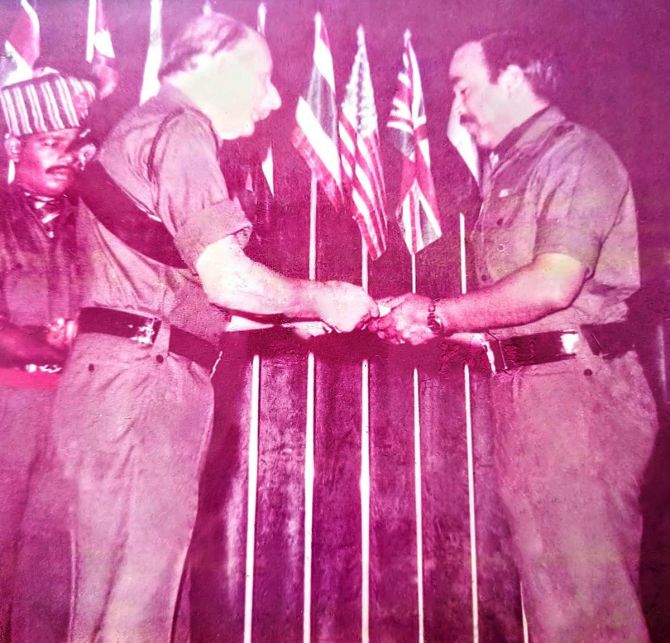
The DS (Coord) announced -- 'For the best research project in the Army Wing, the Lentaigne Medal goes to Major Syed Ata Hasnain of the Garhwal Rifles'.
I got up, marched to and up the dais and then did a smart halt, saluted and waited.
Sam walked up; his eyes fixed on my name plate. He did not carry the medal to dispense and get over with.
"Your name" he said.
"Ata Hasnain, Sir", said I.
I knew his brain was whirring.
"Any relation of Joe, Joe Hasnain?" said he.
"His younger son, Sir," said I.
He patted my shoulder and said -- "I had that inkling the moment I heard the name announced and saw you walking up and because they said you are from Garhwal Rifles."
For those who may have read the story authored by me and carried on Facebook some years ago, called Choice of Nations, it may be recalled that my father Joe Hasnain, then a captain in the 1st Royal Garhwal Rifles, in 1947 had used some sound logic to extend the reasons for his opting to be a part of the Indian Army when the choice lay before him to also opt for the neighbouring army.
"Joe is my friend and a damn great officer. We were at Wellington many years ago and he was one of my Brigade Commanders in NEFA," said Sam, pumping my hand.
"Sir, I know all about your association with him, but I have an association with you too. I am from Sherwood; yes, Sherwood College Nainital; your alma mater is also my alma mater," I said in one rush of words.
"Well done, son, you'll make your parents and your Regiment happy. Joe is one hell of a Garhwali. You tell him that".
The Commandant, Lieutenant General Faridoon Billimoria, was feeling strange standing aside and listening to this private talk between a Field Marshal and a lowly Garhwali Major who had just won an award.
Both were khandani (pedigreed) Parsis and both belonged to the Gorkha Rifles (Sam from the 8th and Faridoon from the 5th, which are anyway one group, 58).
This was the first conscious association with Sam in which one could talk with an identity.
The first time we met was in 1957 when he was commanding the Tiger Division at Jammu and I was all of four years old.
The finals of the Division athletics tournament were being held and like good old army folks my parents had taken me there to watch and later enjoy the traditional Vimto, Cream Roll and other delightful savouries.
Well before tea I left my mother's hand and walked off to explore and then lost my way.
It was as bad as getting lost in the jungles of Sri Lanka.
I was found just when prize distribution was being done by Sam, the General Officer Commanding.
I was hoisted on his shoulder as a prize for me, for having been found.
My mother was thrilled; everyone was thrilled by whatever Sam did. It was a part of his personality.
Cut to Wellington 1961. My father was a Directing Staff at the DSSC and we first lived in a bungalow called Rossie.
It was close to Flagstaff House where Sam as the Commandant resided.
I would often see him in the splendid black Plymouth car being driven up and down the hill.
His long nose was always so characteristic and his moustaches well clipped.
He always wore the side cap of the 8th Gurkhas, his regiment after Partition.
On Children's Day 1961 DSSC gave a treat to all the kids. Sam came for it along with Siloo, his wife.
While he was distributing chocolate packets to us we kids danced around him -- "Uncle one more, Uncle one more".
Sam was visibly annoyed. "Don't call me Uncle, I am no relative of your father" he said. "Call me Sam," he added.
That is why I always called him Sam, even when he was Field Marshal. After all, he gave me the sanction.
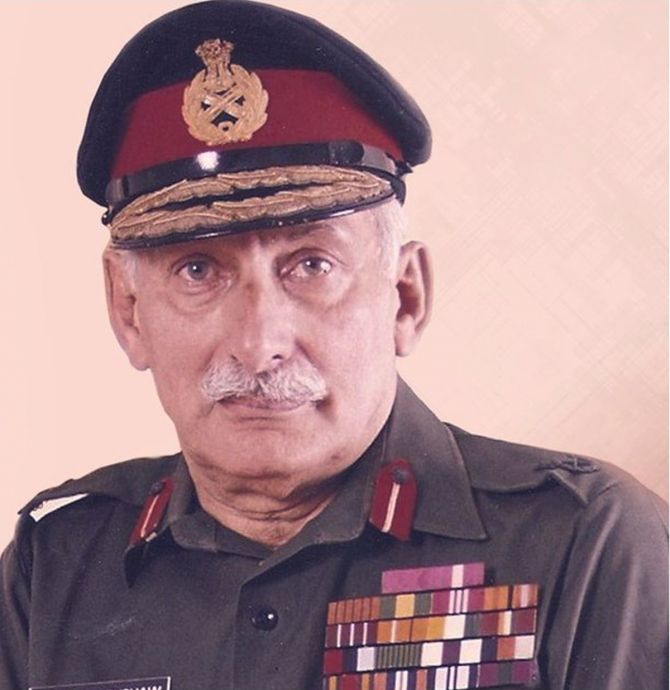
My father, always known as Joe, was a regular bridge partner with Siloo.
He was one of the best bridge players in the Indian Army at one time.
I never inherited this quality, although he always stated that without knowing bridge you cannot be an effective general.
In the discussions at the bridge table the players (all instructors at the DSSC) would often relate stories of Sam's professional exploits in the syndicate rooms, his quips, smart repartees and jokes.
Siloo would dismiss all that with the wave of her hand and say "Oh, that Sam, he is mad."
Sam was later GOC 4 Corps at Tezpur, appointed after being resurrected.
He was virtually in the dog house for promotion to lieutenant general because some people close to the then defence minister reported Sam's 'perceived to be maverick' ways to him.
It took a crisis such as the War of 1962 to bring him back to prominence and the appointment of GOC 4 Corps where he gave his famous statement -- 'There will be no more withdrawal'.
I know that Sam said it with a straight face, shorn of any emotion and no expression of anger.
It was with a twinkle in the eye again and I hope Meghna Gulzar has captured it exactly like this in the scene that must have been enacted.
While in Kolkata after being appointed the Army Commander Eastern Command, Sam was given a civic reception by the mayor.
In the function one young Leftist student stood up and started shouting anti-India slogans and 'down with Indian Army' type utterances.
I don't know what I would have done under the circumstances but Sam got up from the dais, walked down to the student and gave him a rap on his shoulder.
The young man was flustered.
He blurted -- "Sir I only wanted a photograph with you".
Sam quipped -- "Why with me, ask my wife for a photograph with her; she is better looking."
The hall burst out laughing and the mayor's embarrassment was well neutralised by the chief guest.
In April 1969 the government announced that Sam would succeed General P P Kumaramangalam (best known as General K) as the army chief.
On 5 June 1969 while still the army chief designate, Sam came as the chief guest for the centenary of his alma mater, Sherwood College Nainital.
That was an alpha moment for the school and someone like me who had just passed out from it.
Two incidents come from memory. As Sam walked into the centenary play at the Milman Hall he saw the young ladies from All Saints School, our sister institution.
Before proceeding to sit down he went up to them and putting his hands in the air he stated - "All Saints girls, as pretty as ever."
There were blushes all around but the young ladies from All Saints could not have had it better.
In his centenary speech Sam mentioned two things which had the audience in splits.
"When I was in Burma, I realized I could live on so little; no food for days. Then it dawned upon me that I lived many years in Sherwood eating the food of its kitchen and survived; I could therefore survive anywhere, Burma's jungles were no challenge," said he in a tongue in cheek comment on the food of our school kitchen, which I maintain is probably the best among all public schools.
He went on to say -- "While fighting the Japanese I realised I had to build up passion within, to hate them so that I could bring my anger to the battle. It was not difficult because I always had that anger for the other enemy," -- St Joseph's, across the hill (our rival school, colloquially called Sem, not Sam).
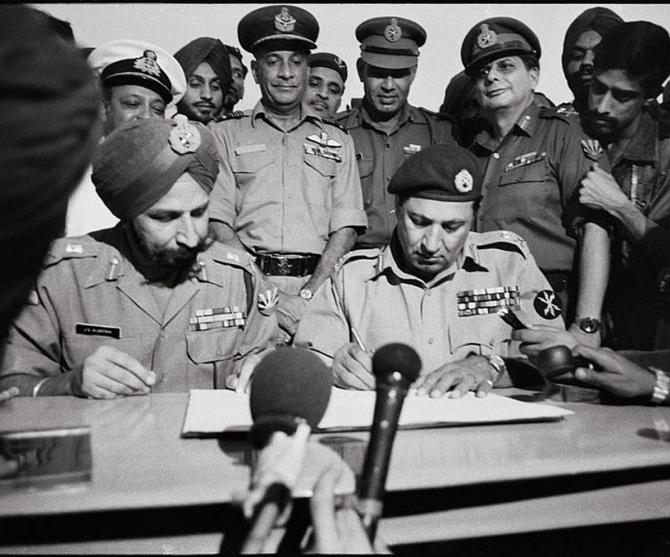
Sam's golden period was the War of 1971.
Having advised the prime minister to stall the beginning of operations to a later period he got down to readying the Army for the operations, choosing the right commanders and deploying formations as per eventual employment.
He chose as his DGMO another classic soldier Lieutenant General (then Major General) Inder Gill, a paratrooper who too was known for his classic humour.
There are many who claimed the responsibility for the plans that led to the victory on 16 December 1971.
However, the eventual credit should go to the man who would have been blamed if the plans had all failed. That was Sam Manekshaw.
Lieutenant General Syed Ata Hasnain (retd), PVSM, UYSM, AVSM, SM, VSM is one of India's most respected commentators on national security.
The general commanded the Indian Army's 15 Army Corps in Kashmir and was known as the 'People's General' in the Kashmir Valley
General Hasnain is a frequent contributor to Rediff.com.
Feature Presentation: Aslam Hunani/Rediff.com


